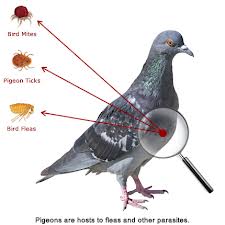 Pigeons are prolific breeders, hatching several broods a year and sometimes laying a new clutch of eggs before the previous batch of fledglings has left the nest. Pigeons are comfortable with humans and are not easily scared away or deterred. Our houses and commercial buildings often have architectural features such as eaves and drain spouts that make ideal nesting sites for a bird that in its native habitat would nest in the cavities and hollows of steep rock cliffs.
Pigeons are prolific breeders, hatching several broods a year and sometimes laying a new clutch of eggs before the previous batch of fledglings has left the nest. Pigeons are comfortable with humans and are not easily scared away or deterred. Our houses and commercial buildings often have architectural features such as eaves and drain spouts that make ideal nesting sites for a bird that in its native habitat would nest in the cavities and hollows of steep rock cliffs.
Pigeons are creatures of habit and highly social. Once they find an easy food source and comfortable nesting and roosting site, they will return again and again, along with a few hundred of pigeon pals. Unfortunately, they make unsanitary, unhealthful and destructive neighbors.
Pigeons carry parasites, including mites, fleas, ticks that are dangerous to humans and domestic animals. Pigeons may also encourage other pests, such as rats, which feed on dead pigeons and the food sometimes scattered for pigeons by well intentioned bird-lovers. Wheeling in large flocks, pigeons pose a hazard to planes in airport settings, and often outcompete our native birds for food and habitat.
Pigeon droppings not only look and smell terrible, they damage buildings, statues, equipment and other outdoor structures, kill landscape plants and attract flies. Pigeon droppings, especially when dry and airborne, can expose humans to several diseases, including Newcastle disease, aspergillosis, candidiasis, encephalitis, histoplasmosis, ornithosis, salmonellosis, toxoplasmosis, and cryptococcosis and coccidiodomycosis, which cause meningitis.
Pigeons are not protected under federal law, but many local governments do have laws regulating pigeon deterrence or removal. Domesticated homing or hobby pigeons should be identifiable by a band on one leg, and in many areas it is a misdemeanor offense to harm or kill them.
Once a flock of pigeons has gotten comfortable at your home or commercial building, it can be stubbornly resistant to removal, often requiring the services of pest control or animal control professionals. As is true of many household pests, a first step to controlling feral pigeons is to remove their food source.
Tips to deter pigeons:
- Keep areas around trash bins and outdoor dining areas clean;
- Encourage children to pick up spilled treats—and teach them NOT to feed the pigeons.
- Eliminate water sources such as overwatered lawns, bird baths, or kiddy pools
- Screen drains and gutters to make your property less attractive to pigeons
If you need help to prevent or eliminate problem pigeons, please contact our trained Sacramento pest control professionals at 916-457-7605.

